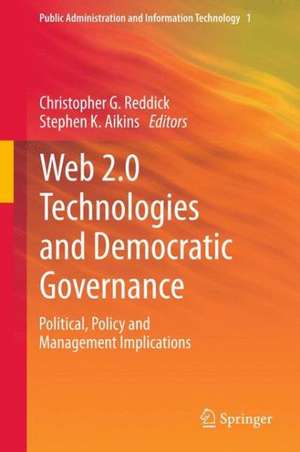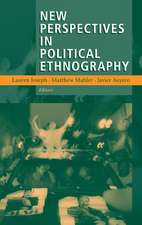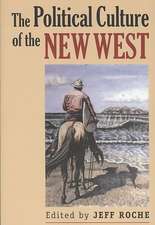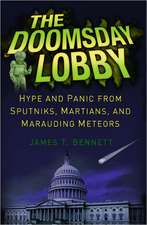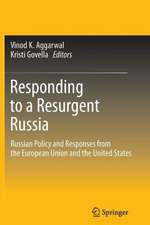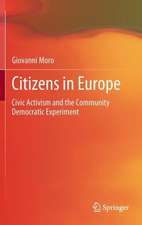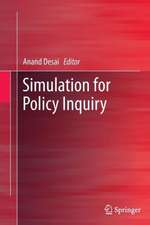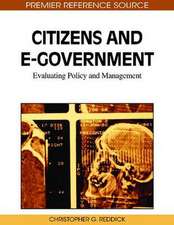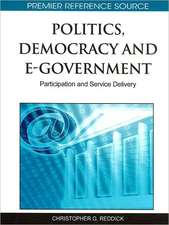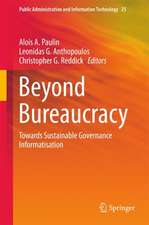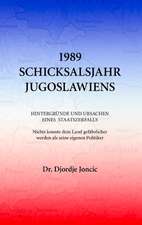Web 2.0 Technologies and Democratic Governance: Political, Policy and Management Implications: Public Administration and Information Technology, cartea 1
Editat de Christopher G. Reddick, Stephen K. Aikinsen Limba Engleză Paperback – 17 iul 2014
| Toate formatele și edițiile | Preț | Express |
|---|---|---|
| Paperback (1) | 944.19 lei 6-8 săpt. | |
| Springer – 17 iul 2014 | 944.19 lei 6-8 săpt. | |
| Hardback (1) | 948.79 lei 6-8 săpt. | |
| Springer – 16 iun 2012 | 948.79 lei 6-8 săpt. |
Din seria Public Administration and Information Technology
- 20%
 Preț: 689.21 lei
Preț: 689.21 lei - 18%
 Preț: 1121.13 lei
Preț: 1121.13 lei - 15%
 Preț: 652.64 lei
Preț: 652.64 lei - 18%
 Preț: 1010.03 lei
Preț: 1010.03 lei - 15%
 Preț: 649.06 lei
Preț: 649.06 lei - 15%
 Preț: 638.57 lei
Preț: 638.57 lei - 20%
 Preț: 336.35 lei
Preț: 336.35 lei - 15%
 Preț: 650.04 lei
Preț: 650.04 lei - 15%
 Preț: 639.08 lei
Preț: 639.08 lei - 20%
 Preț: 562.85 lei
Preț: 562.85 lei -
 Preț: 386.22 lei
Preț: 386.22 lei - 18%
 Preț: 787.91 lei
Preț: 787.91 lei - 18%
 Preț: 783.20 lei
Preț: 783.20 lei - 18%
 Preț: 791.57 lei
Preț: 791.57 lei - 18%
 Preț: 958.07 lei
Preț: 958.07 lei - 15%
 Preț: 643.00 lei
Preț: 643.00 lei - 18%
 Preț: 1230.35 lei
Preț: 1230.35 lei - 18%
 Preț: 894.16 lei
Preț: 894.16 lei - 18%
 Preț: 784.13 lei
Preț: 784.13 lei - 15%
 Preț: 648.24 lei
Preț: 648.24 lei - 18%
 Preț: 778.45 lei
Preț: 778.45 lei - 18%
 Preț: 891.33 lei
Preț: 891.33 lei - 18%
 Preț: 1009.22 lei
Preț: 1009.22 lei - 18%
 Preț: 722.40 lei
Preț: 722.40 lei - 18%
 Preț: 893.05 lei
Preț: 893.05 lei - 15%
 Preț: 646.62 lei
Preț: 646.62 lei - 18%
 Preț: 888.01 lei
Preț: 888.01 lei - 24%
 Preț: 754.46 lei
Preț: 754.46 lei - 18%
 Preț: 789.03 lei
Preț: 789.03 lei - 15%
 Preț: 637.59 lei
Preț: 637.59 lei - 15%
 Preț: 642.51 lei
Preț: 642.51 lei - 18%
 Preț: 797.55 lei
Preț: 797.55 lei - 15%
 Preț: 651.51 lei
Preț: 651.51 lei
Preț: 944.19 lei
Preț vechi: 1151.45 lei
-18% Nou
Puncte Express: 1416
Preț estimativ în valută:
180.70€ • 188.15$ • 152.71£
180.70€ • 188.15$ • 152.71£
Carte tipărită la comandă
Livrare economică 07-21 martie
Preluare comenzi: 021 569.72.76
Specificații
ISBN-13: 9781489992840
ISBN-10: 1489992847
Pagini: 288
Ilustrații: XII, 276 p.
Dimensiuni: 155 x 235 x 15 mm
Greutate: 0.41 kg
Ediția:2012
Editura: Springer
Colecția Springer
Seria Public Administration and Information Technology
Locul publicării:New York, NY, United States
ISBN-10: 1489992847
Pagini: 288
Ilustrații: XII, 276 p.
Dimensiuni: 155 x 235 x 15 mm
Greutate: 0.41 kg
Ediția:2012
Editura: Springer
Colecția Springer
Seria Public Administration and Information Technology
Locul publicării:New York, NY, United States
Public țintă
ResearchCuprins
1. Web 2.0 Technologies and Democratic Governance.- Section I: Government Policy and Uses of Web 2.0 for Management of Service Delivery.- 2. Information Policy and Social Media: Framing Government-Citizen Web 2.0 Interactions.- 3. Micro-blogging: An Analysis of Government Issued Policies and Best Practices.- 4. The Use of Web 2.0 to Transform Public Services Delivery: The Case of Spain.- 5. Towards a Gov 2.0 society for all: European strategies for public service delivery.- 6. A Viability Model for Digital Cities: Economic and Acceptability Factors.- Section II: Web 2.0 as Tools for Mobilization, Protests and Governance.- 7. Online Collective Action and the Role of Social Media in Mobilizing Opinions: A Case Study on Women's Right-to-Drive Campaigns in Saudi Arabia.- 8. Webmonitoring and Strategic Issue Management: Dutch student protests against the 1040-hour norm.- 9. Web 2.0 as a Technological Driver of Democratic, Transparent and Participatory Government .- 10. Emergent Networks of Topical Discourse: A Comparative Framing and Social Network Analysis of the Coffee Party and Tea Party Patriots Groups on Facebook.- 11. Whither E-Government? Web 2.0 and the Future of e-Government.- Section III: Effects of Web 2.0 on Political Campaigns and Participatory Democracy.- 12. Campaigns and Elections in a Web 2.0 World: Uses, Effects, and Implications for Democracy.- 13. Measuring the effects of Social Media Participation on political party communities.- 14. Social media for political campaigning. The Use of Twitter by Spanish mayors in 2011 local elections.- 15. Government-Citizen Interactions Using Web 2.0 Tools: The Case of Twitter in Mexico.- 16. Secrecy versus Openness: Democratic Adaptation in a Web 2.0 Era.- 17. Blending social media with parliamentary websites: just a trend, or a promising approach to e-participation?.
Textul de pe ultima copertă
Web 2.0 has become the buzz word for describing social media available on the Internet, such as blogs, photo and file sharing systems and social networking sites. These Web 2.0 applications are rapidly transforming citizen-citizen and citizen-government interactions in a manner not seen before. In recognition of these trends, governments are already taking a very close look at Web 2.0 and online communities in order to leverage them for designing products and services and for providing citizen services. This book brings together international scholars to provide the theoretical and practical contexts for understanding the nature of Web 2.0 technologies and their impact on political, public policy and management processes, and to explore how best Web 2.0 applications can be leveraged and aligned with the strategic goals of government organizations to add value and ensure effective governance. Drawing from experiences from countries around the globe, the book provides the theoretical context of the potential for Web 2.0 applications to transform government services, as well as practical examples of leading public sector institutions that have attempted to use Web 2.0 applications to enhance government operations, policy making and administration. There are three parts to the book, namely 1) Perspectives on Web 2.0 and Democratic Governance, 2) The Political, Policy and Management Impacts of Web 2.0 in Government, and 3) Leveraging Web 2.0 Applications for Effective Governance. This book differs from existing edited books on Web 2.0 technologies that focus primarily on politics and e-democracy because it examines the impact of the applications on politics, policy and public management. The book contributes toward the literature by filling the existing void and expanding knowledge in the field of public administration and policy, making it of interest to both academics and policy-makers.
Caracteristici
Brings together international scholars to provide the theoretical and practical contexts for understanding the nature of Web 2.0 technologies Examines the impact of Web 2.0 applications on politics, policy and public management Provides a much-needed resource for policy-makers setting policy goals and developing Web 2.0 strategies that initiate new interactive ways of policy-making, improve data and information management, and stimulate the development and use of knowledge for effective public management Includes supplementary material: sn.pub/extras
